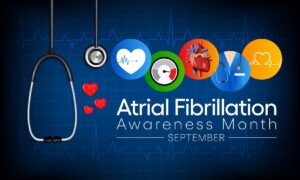National Atrial Fibrillation Awareness Month
That rush of blood that brings a flush to your cheeks accompanied by gentle palpitations.
That fluttering in your heart that comes about when you’re excited, nervous, or falling in love.
It is a familiar feeling that is completely normal and absolutely not what we are here to discuss today.
We are here to talk about something seemingly similar but much more dangerous to your health: atrial fibrillation.
The Medical Group of New Jersey treats atrial fibrillation in New Jersey. In September, we raise awareness about atrial fibrillation, a widespread but still somewhat innocuous heart condition. As part of our efforts, we will define atrial fibrillation and discuss some of its lesser-known details.
What is atrial fibrillation?
Atrial fibrillation (AFib) is a common heart rhythm disorder characterized by irregular and often rapid heartbeats. It occurs when the heart’s upper chambers, known as the atria, do not beat in a coordinated or rhythmic manner. Instead of contracting as they should to push blood into the lower chambers (ventricles), the atria quiver, leading to an irregular heartbeat.
The most notable sign of AFib is an irregular and often rapid heartbeat. Instead of a regular “lub-dub” pattern, the heart may beat irregularly and chaotically. In addition to irregularity, AFib can cause a fast heart rate, often exceeding 100 to 175 beats per minute. This rapid heart rate can lead to symptoms such as palpitations (a feeling of fluttering or racing in the chest), dizziness, and shortness of breath.
Why is atrial fibrillation a problem?
- AFib is associated with an increased risk of stroke. When the atria quiver instead of contracting correctly, blood can pool in the atria, forming clots. These clots can break loose and travel to the brain, causing a stroke.
- AFib can lead to other heart-related complications,including an increased risk of heart failure, as the heart may not pump blood effectively. It can also lead to the development of other abnormal heart rhythms.
What causes AFib?
The exact cause of atrial fibrillation varies but is often related to underlying heart conditions, such as high blood pressure, coronary artery disease, heart valve disease, or other structural heart problems. Lifestyle factors, such as excessive alcohol consumption, obesity, and sleep apnea, can also contribute to the development of AFib.
Stay on top of your heart health with regular check-ups. Talk to your doctor immediately if you experience any signs of AFib or other heart-related health concerns. The sooner you diagnose an issue, the more likely you will be able to treat it.
Help raise awareness by sharing this blog on social media!